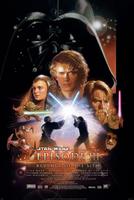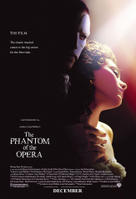Star Wars Episode III: Revenge of the Sith
 Director: George Lucas
Director: George LucasMain Cast: Ewan McGregor, Natalie Portman, Hayden Christensen, Ian McDiarmid
Writer(s): George Lucas
Director of Photography: David Tattersall
Producer: George Lucas & Rick McCallum
Editor(s): Roger Barton & Ben Burtt
Original Score By: John Williams
Release Date: 2005 May 19
I'm a self-proclaimed Star Wars fanboy. I was the kid you saw walking around in the Return of the Jedi silk-screened T-shirt carrying the lighted retractable battery-powered lightsaber and all my action figures stored in the Darth Vader head carrying case. This was my childhood reality.
I was undeniably saddened after seeing the first prequel. Could it be that my beloved alternate universe, my heroic sci-fi fairytale had been so utterly undone by its very maker? The first viewing of the abomination that is Episode I left my midichloreans boiling, but I'll save that for another time. For now I'll focus on Episode III.
Revenge of the Sith made strides to improve what had been destroyed by its predecessors, but it did not fully succeed. I was motivated to see Episode III primarily out of obligation to the franchise and to do my part in further supporting the Lucas Empire. Despite my obvious pessimism, my anticipation was high. Unfortunately, it was with mixed feelings that I left the theater.
Having just watched Episode II, the first thing I noticed about III was the improvement in the editing. Not being afraid to stay with a particular storyline as it developed into something significant was a tremendous achievement over its predecessors. The addition of a new co-editor may have had a hand in this accomplishment. Many recent and highly successful films have built their storytelling upon multiple parallel plotlines and Episode III was no different and faired about average in its execution of the technique. There were a few instances, particularly with Anakin and Padme, that felt forced and quick. It was almost as if Lucas knew he had done a poor job at building the depth of the relationship in the first prequels and wanted to throw in some extra sentiment to make up for it. Overlooking the few flaws here and there, the editing exceeded by leaps and bounds the previous two films and provided a sturdy backbone on which the story could be built.
Since I have started in on the Padme/Anakin relationship I'll lay it to rest. I just didn't buy it. The relationship was developed in a very awkward manner. Call it the dialogue, the editing, the directing, the acting, I don't know, but this connection was key to the story and it was performed less than impeccably.
For as much as Anakin was supposed to have loved Padme, he didn't seem too affected when he was "breaking [her] heart". Call me crazy, but if my pregnant wife was crying and upset about something that I was doing I would probably stop long enough to evaluate whether she had a valid point before I just blurted out, "I'm doing this for you". This would be especially true if we were standing on a shaky outcropping 30 yards from an erupting volcano. To be fair, maybe the Dark Side overrides everyday common sense, as well as making your eyes yellow and bloodshot.
It seemed that Padme's primary job in this film was to stand or pace around, look pregnant, and worry about Anakin. Portman is far too skilled an actress to be left just doing that. Also, how is it that no one else in the galaxy noticed that she was pregnant? It seemed like from the scene right after she told Anakin her womb was blossoming, but no one seemed to mention anything about it. Perhaps her baggy ballroom gowns hid the growing belly or maybe everyone thought she had just been putting on a few pounds lately and was afraid to mention it. Nevertheless, I found this odd. Her death was rather convenient too. I saw this merely as a convenient plot point to further move the epic forward.
Throughout the film there were some dastardly misguided scenes. The first of two that stick out most in my mind is the oil scene with R2 and the droids. C3PO and R2D2 have always provided a sort of dry roll-your-eyes kind of humor (perhaps, James Bond was C3PO in a former life), but to me this was simply too over the top. But worse than that, if it can be imagined, was the scene where the Supreme Chancellor told Vader that Padme had died because of his anger. It was like watching Plan 9. Vader stumbles forward and melodramatically shouts, "NOOOOOOOOOOOO!". A moment that really should have been wrought with horror, anguish, frustration, and pain was more like watching a mechanized mannequin look up to the third floor petite section while pondering what to have for lunch. It's very sad that instead of feeling the pain of losing someone I cared about I found myself with a sheepish grin wondering if this scene could have in some way been salvaged.
The dialogue in this film improved little over the previous disasters. "Hold me like you did by the lake in Naboo". Is it really possible to deliver this line with a straight face? I would love to see an outtake reel. Lucas is a great visionary, but he should leave the screenplay writing to the experts.
One thing that typically allows me to buy into the fantasy worlds created by the movies is that they stick to the rules in which the characters must exist. The Sixth Sense is perhaps the best example of this, where multiple viewings hold few or no flaws, but there are many others as well. If rules for an alternate world are set down they should be meticulously followed to maintain believability. In one scene the Jedi are jumping fifty feet in the air and in the next they are hanging from a ledge struggling to climb up. Set down the rules and stick to them. Every action that violates the guidelines Lucas has created leaves the audience critical of its reality and prevents them from being fully engulfed in the story being presented.
Lucas's true brainchild, in my opinion, is Industrial Light and Magic. The Star Wars prequels, while they have made enormous amounts of revenue are frequently little more than showcases of ILM's digital prowess. This Episode was more successful than the previous, but only in some ways. The landscapes more believable, the ships more realistic, the movements, textures, and lighting much more accurate are examples of how 21st century technology have helped to build the universe that is Star Wars. While they were exceptional, I grew tired of their abundance and omnipresence. 99.9% of the actors screen time was spent in front of a blue/green screen. Perhaps this is why it was difficult to act appropriately? The effects were great, but perhaps a bit overused and, for me, frequently detracted from the storytelling.
On the positive side, McDiarmid, McGregor, and Oz were fantastic. In my estimation, they made up for much of the movies misteps. McDiarmid as the Supreme Chancellor put a face to the evil that is the Dark Side. He was cunning, conniving, and ruthless. McGregor as Obi-Wan was such a spitting image of what I imagined would be a young Alec Guinness that I could have sworn they were related outside the film. Yoda's new image (CG) was nothing compared to the nostalgic mismatched sentences and wise comments that Oz brings to the character. Once again he captures the essence of the smallest Jedi master.
John Williams masterfully blended the themes from Episodes IV through VI into those from I and II to create a mesmerizing blend of emotions. At times the music left me in awe. It captured the nostalgic feelings that I remembered so vividly from the older of the six movies. Another oustanding performance, from perhaps the most recognized film composer of all time.
In general, the Star Wars films are essentially an epic battle between good and evil. Much of this war can be summarzied in the "turning" of Anakin. Even though the struggle between good and evil in Anakin was not expertly depicted, there were points where I found myself wanting him to choose the side of good and forsake the destiny the whole audience knew he was headed for. That simple fact must mean that Lucas had done something right.
During the film I was able to pick out some interesting moral dilemmas from the film's plot. Anakin was faced with what he thought was the unavoidable death of his beloved wife. He succumbed to the Dark Side and turned from what he knew was right with the promise that he may be able to deliver her from her destiny. It raised the question in my mind: At what point would I sacrifice my faith in the Good, True, and Pure to save those I love? Does that point exist for me? It is a question easily answerable from the comfortable seat in which I currently sit, but when faced with the reality of such a situation I am pained to think of how I might react.
The Star Wars films are heaving with spiritual concepts. Most have New Age connotations, but some parallels to other beliefs can undoubtedly be made. The Dark Side in Episode III is clearly presented to Anakin in such a way as to deceive him. He is promised power beyond what he currently has and knowledge that will make him stronger. The power to see what the Jedi do not want him to see or know. A true Deceiver, such as the Chancellor, is crafty and hides lies within the truth. "The Jedi won't tell you everything. I can teach you the ways of the Dark Side. This will make you more powerful than you can imagine". He seems to say that Anakin can gain wisdom only by succumbing to his predisposition to evil. I was struck by the parallel to the Genesis account of the Fall of Mankind. In a film with overwhelmingly New Age notions, this was a interestingly accurate and graphic depiction of the consequences of the first sin.
Apparently there were other underlying messages to be found. For those viewers that thought there was a modern day political commentary with regards to President Bush and the war on terror, I guess I missed the whole thing. Frankly, though, I don't really care to find it. And I'll leave it at that.
Bottom Line: Episode III left me with a bittersweet tast in my mouth. Bitter because the saga has ended and with an imperfect conclusion. Sweet because the film, while not sidestepping all the landmines, was able to avoid many of the traps the other two prequels so easily fell into. The acting was acceptable with some shininig moments, the editing and effects improved, the storyline fantastic, and the dialogue clunky, at best. Despite my overall positive impression I'm still not sure whether I liked the film for its merits or simply because it was so much better than Episodes I and II. I'd say a mostly solid completion to a mostly solid American pop culture phenomenon.
A biased, 7 out of 10
~RG





